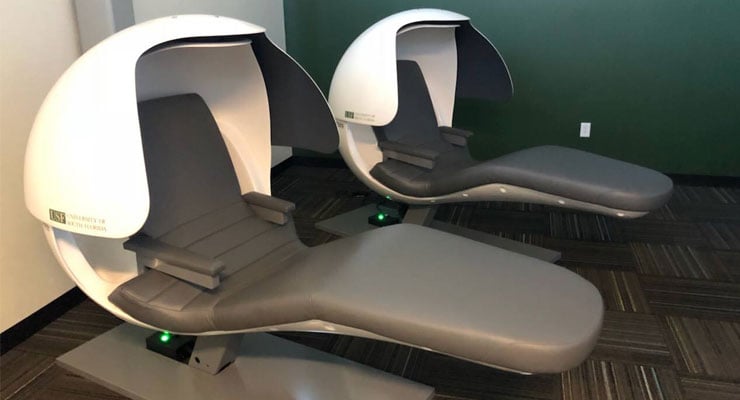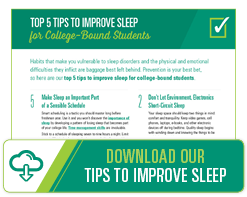Top 5 Tips to Improve Sleep for College-Bound Students
By Kathleen Koviak | Last Updated: Mar 5, 2025

Between last minute assignments, social engagements with friends, and perhaps working a part-time job, sleep can easily fall to the bottom of a student’s priority list. Even when things start piling up during your semester, it’s important to remember that small changes to your sleep routine can make a big difference – both in how you feel and your GPA. Here are our top 5 tips to improve sleep for college-bound students.
5. Schedule It In
You may have heard that college students learn to function on little to no sleep and frequently pull all-nighters in preparation for exams or finishing papers. But did you know that the amount of sleep directly correlates to how well students do in the classroom? Sleep is when our brain stores important memories and gives us energy for the day ahead. So by studying late into the night, you’re actually less likely to remember those facts on the test.
Young adults typically require 7-9 hours of sleep per night. While that may seem like a lot, students who prioritize their sleep and make it a part of their schedule will be more focused and productive throughout the day. Most universities offer a free planner, which can help you keep track of important assignments and deadlines and manage your time effectively.

4. Monitor Your Caffeine Intake
While ordering that pumpkin spice late is a nice Fall treat, consuming too much caffeine or at the wrong time can wreak havoc on your sleep. For most adults, experts agree that 300-400 milligrams (mg) of caffeine a day is a safe amount. This is equivalent to about 3-4 8oz cups of brewed coffee. However, if you are feeling jittery, unable to sleep, or have an upset stomach, you may want to cut back on your caffeine consumption.
It is also important to note that the effects of caffeine can last for up to 8 hours, so it’s best to avoid it later in the day so as not to interrupt your sleep. If you are feeling tired, try a short 20-30 minute nap instead of caffeine for your afternoon pick-me-up!
USF has “Relaxation Stations” inside the Wellness Centers where you can pop in and snooze in one of their state of the art nap pods! The Wellness Centers now have later hours, too, so you can unwind after a long day of class.

3. Don’t Let Electronics Short-Circuit Your Sleep
These days, we spend a lot of time staring at screens. Whether it’s our laptops, tablets, TVs, or phones, the light emitted from these devices can make it harder for you to fall asleep. It is recommended to power down at least 30-60 minutes before bed to allow the effects to wear off. If you use your phone as an alarm, consider placing it on the other side of the room, so you won’t be tempted to scroll through Instagram and will also force you out of bed in the morning to turn it off.
The environment you sleep in can impact your quality of sleep, as well. A space that is cool, dark, and quiet is most conducive to a good night’s rest. Noisy roommates? USF’s Wellness Centers offer free sleep packs, which include ear plugs, an eye mask, and sleepy time tea to help you wind down and relax.
2. Find Ways to Cope that Work
The transition into college and a new way of life isn’t easy and is likely to bring with it some amount of stress, which can also interfere with sleep. Knowing what to expect when you arrive, from roommates and learning your way around, to joining an organization and getting into a routine, can help get you over those first few hurdles of adjusting to college life.
Establishing healthy ways to cope with stress will serve you both now and in the future. Find things you enjoy, and make sure you make time for them. Try some guided meditation or take a walk in nature to ease your mind. Engaging in some sort of physical activity every day is another great way to reduce stress, and will also help you sleep better at night.

1. Know Where to Turn for Help
Of course, you can try follow all of these tips and still find yourself feeling half-awake and anxious about everything on your plate. That is where support systems at your university can step in to help.
USF’s Health and Wellness Department offers resources and information to help students enhance their physical and mental well-being and allow them to succeed. Taking advantage of a service like Success & Wellness Coaching, where students can meet with a certified coach one-one-one to talk about their goals and strategies to achieve them is a great place to start. The Counseling Center also offers drop-in groups on mindfulness meditation and anxiety reduction, which may be just what you need to rest easy.



